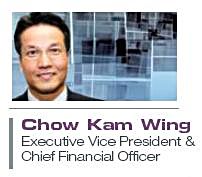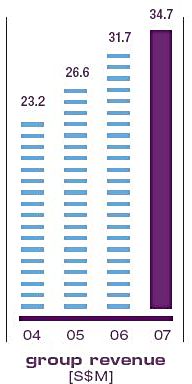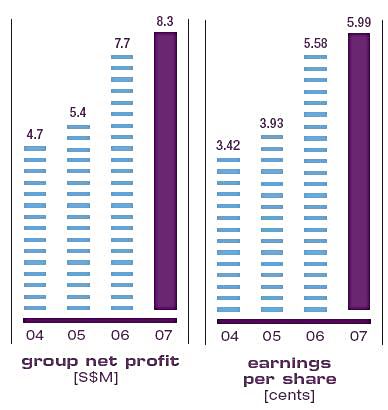
In 1983, Micro-Mechanics began operations in Singapore with a founding capital of $1,200, one employee and a 500 sq. ft. workshop. It has grown into a publicly-held corporation with eight worldwide facilities and about 450 people. The company designs, manufactures and markets precision tools, assemblies and consumable parts that are used to manufacture and test semiconductors.
THESE FEW years, I have grown to admire Micro-Mechanics the company and its board of directors. I am learning from them too even during AGMs.
It was the comments of Chow Kam Wing, chief financial officer (CFO) of Micro-Mechanics, in an article after winning CFO of the Year for companies in the Sesdaq (now Catalist) category that enabled me to finally make up my mind about sale-and-leasebacks for property in Singapore.
This was what was reported:
‘We understand the semi-conductor industry is not a straight line business,’ he said. It is one of the reasons why the firm has paid up for its three buildings in Singapore, Malaysia and the United States. ‘If there is downtime, we just pay the salaries,’ he said. Having no debt is a buffer for the bad times, he added.

It is so simple. Why didn’t I think of it earlier?
As we are in downtime now, maybe I can dig out names of listed companies which sold their properties to REITs, and see how they are coping with the step-up rents.
Here is another sign of Micro-Mechanics’ prudence:
As CFO, one of his jobs is to mitigate foreign exchange risks which can be a headache given that 44 per cent of sales is in the US dollar which has been falling against the Asian currencies. But the group’s factories are based in Asia which is also fighting high inflation.In 2006 the firm suffered a $97,000 forex loss. Since then, he put in a simple hedging system.
Every week, all sales are sold into forward contracts with the banks. In addition, the company tries to sell in local currencies.‘It’s simple and conservative. We didn’ t listen to banks which tried to sell us some derivatives,’ he said. ‘I tell my boss, forex we can’t earn but we try to minimise the loss,’ he added.
During the recent AGM, Mr Chow again commented that they are remitting all cash back to DBS in Singapore as the credit market is falling apart. Singapore is the safest and DBS has the backing of our government.
Great but it is unwise to put all of a company’s cash into a single bank.
He listens to shareholders and gets the message. During the AGM, someone asked for the reasons the company bought AMP3, which is loss-making in the US (apart from the reasons already announced).
The CEO Christopher Reid Borch let the COO answer. Mr Low Ming Wah gave his assessment and reasons with confidence.
And Independent Director Ng Beng Tiong weighed in by saying the board of directors agreed only after knowing the CEO had agreed to stay and manage AMP3.

This board of directors, especially independent directors, does not rubber stamp - even on an acquisition that cost only $2.22 million, or 1/4 of FY2008 net profit.
One of the independent directors shot down the idea of putting the company’s extra cash into a fund. In fact if I am not wrong, it was Mr Ng who shot it down.
Recently there was a proposal to invest the firm’s $13.5 million in cash in an investment fund to get better returns instead of just sitting in a fixed deposit account but the independent directors shot the idea down, he said. ‘They highlighted the risks,’ he added.
While it is not easy to evaluate management, at least Micro-Mechanics is showing the way. Just read its annual reports and media articles.
This article was first published on Donmihaihai’s blog and has been adapted for publication here with the kind permission of the author, a 30-year-old retail investor.
To read more about Micro-Mechanics, here's a link to a Feb 08 Business Times article.

